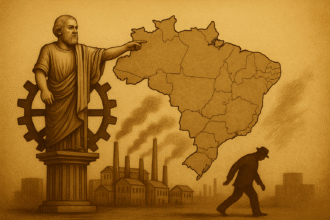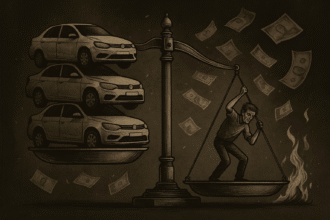When the State finances, profit is certain — for some
In the week that the Lula government announced the creation of Track 4 of the program My Home, My Life, aimed at families with incomes between R$8,000 and R$12,000, a well-known name in the real estate sector came into the spotlight: Rubens Menin, founder of MRV Engenharia. In a statement enthusiastically reproduced by media outlets such as Brazil 247 and the CNN Brazil, Menin praised the measure:
“This is excellent news, both for the construction industry and for Brazilian families.”
But as always happens when the government “helps”, it is worth asking: who is really being helped?
The social facade of a guaranteed business
Minha Casa, Minha Vida is sold as a social program, but in practice, it represents a direct injection of public resources into private companies, with profits assured by government contracts, subsidies and guarantees. MRV, the largest construction company in Latin America, was for years the largest beneficiary of this program.
According to a report by The Intercept Brasil, in 2018, 77.8% of MRV's launches were within the housing program. It is no coincidence that the company was celebrating record results. What is sold as “public policy” is, in fact, an indirect transfer of wealth: from the taxpayer to corporate profit.
Reference:
The Intercept – MRV, the company that profits the most from Minha Casa Minha Vida
The old “crony capitalism” trick
From an economic point of view, subsidy is privilege — not social policy. The government chooses a sector, injects money, facilitates credit, reduces bureaucracy. But this does not create wealth. Only moves resources, creating artificial market distortions.
Murray Rothbard was clear:
“Whenever the government intervenes, it benefits some at the expense of others. This is not neutrality. It is coercion disguised as benevolence.”
The case of the real estate sector in Brazil is emblematic. While millions of small entrepreneurs struggle to survive with tight margins and suffocating taxes, giants like MRV receive special treatment, cheap credit, guaranteed demand and applause from the press.
The invisible cost: inflation, distortion and bubbles
By subsidizing housing, the government artificially inflates demand. This raises prices for the sector as a whole, reduces the allocative efficiency of capital and can generate speculative bubbles — as has already been seen in countries like the USA, with the collapse of 2008.
Economist Friedrich Hayek warned that:
“Government manipulation of currency and credit inevitably distorts market signals, leading to misallocation of resources.”
In other words: programs like Minha Casa, Minha Vida not only do not solve the housing problem — they make it worse by increasing the price per square meter, displacing investments and concentrating the market.
The alliance of capital with power
It's curious how sectors that claim to be liberal in the economy rush to embrace the State when there is money at stake. Rubens Menin is not wrong in defending his company — the problem is a system that allows (and encourages) this type of symbiosis between politics and business.
The creation of Faixa 4 is an explicit expansion of interventionism. Instead of correcting the fundamentals that make housing more expensive — such as urban bureaucracy, land monopoly and high taxes — the government chooses to expand subsidies for the middle class.
Meanwhile, the taxpayer, who cannot get credit, continues to pay for the party.
The media applauds — and the competition disappears
Sites like Brazil 247, CNN and Value Invest applauded the measure as “innovative”, “inclusive” and “strategically correct to stimulate the construction sector”. No line about the fiscal costs, the risk of a real estate bubble or the fact that smaller companies do not have access to the same financing channels.
Links for reference:
The discourse is always the same: the State “moves the economy”. But in practice, it only moves capital from some to the pockets of others. With the detail that the person paying the bill is not in the photo of the program's signature.
Subsidies are not social justice. They are state capture.
As Bastiat rightly warned:
“The State is the great fiction by which everyone tries to live at the expense of everyone else.”
The problem is not with Rubens Menin. It is with a model that rewards corporatism with public money, distorts the economy and kills legitimate competition.
🧭 Conclusion
When business owners praise the government for programs that increase their revenue with taxpayer money, we are not facing a public policy — we are facing an undeclared pact between power and privilege.
The real housing problem in Brazil is not a lack of subsidies. It is government overreach, poor management of urban land, notarial bureaucracy and devalued currency.
Meanwhile, we continue to finance private profits with public losses.
And calling it progress.
🔗 CTA
📩 Want to keep receiving reviews like this?
Subscribe to the newsletter Economic Radar:





